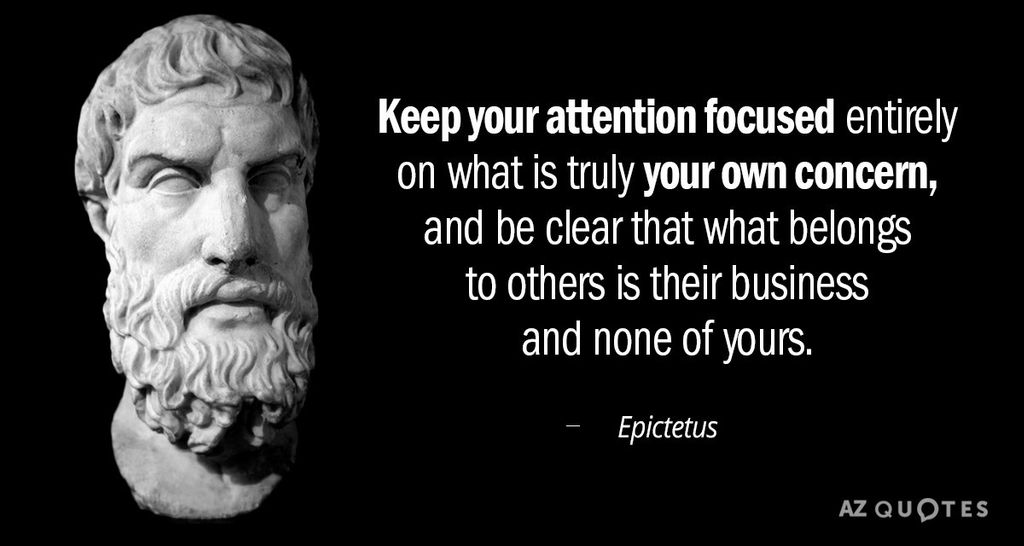How You Can Practice Stoicism
May 28, 2019 • 1 view
Stoicism is a way of life that you can develop and practice every day to help you navigate more easily through all the little and big surprises life has in store for you.

Here is a checklist of 7 ways in which you can incorporate stoicism into your daily life.
#1. Embrace discomfort.
Being stoic doesn’t mean surrounding yourself with material things or other people so that you feel comfortable all the time and expect this state of comfort will make you happy. Instead, it means taking life in stride and making peace with discomfort. Why is this important? Because having something today can mean you take it for granted and expect it to last forever.
But what if it doesn’t last? If you learn how to rely on yourself, then when tough times come around you’re better prepared to deal with them. How do you learn to rely on yourself? Try to solve problems by yourself first even if that means making mistakes, before you give up or turn to someone else to help you fix the situation.
#2. Learn to calm your monkey mind.
On any given day, you probably have thousands of thoughts bouncing around in your mind and let’s face it, a lot of them are not exactly sunny and happy ones. They can also be negative, self-critical, dismissive, they can focus on past failures or tap into your insecurities.
The good news is this: even though you may think it,you are not your thoughts. You are much bigger than your thoughts! And there are ways to effectively manage your thoughts and not let them rule your life, your day, and every waking hour. You can start with a 10-minutemeditationto calm your thoughts. And if your monkey mind doesn’t let you fall asleep easily, try listening to asleepcast.
#3. Take advantage of your unique strengths.
The Stoics didn’t believe in having to change ourselves completely in order to lead a high quality of life. They believed that we should take advantage of our unique strengths and abilities. You can practice this in two ways. First, take an honest look at yourself — who you are, what you are doing, where you are going with your life.
Are you overestimating your abilities or are you being objective and realistic about what you can do and how you can reach your goals? And second, think of ways in which you can take advantage of what you have going for you — your personality, your preferences, the things you’re good at, the skills you possess and take pride in. Then focus on doing exactly that and on developing your strengths, instead of worrying about potential weaknesses or the things you don’t already possess.
#4. Do hard work first before you do anything for pleasure.
Our daily habits tend to play out something like this. On any given day, we give in to the urge to start our morning by checking email and social media apps on our phone and sending messages back and forth with our friends. Is that the best way to start your day? Mornings are the ideal time of day to get the hardest work out of the way. Try maximizing each morning bybuilding a habitof doing your hard work early.
It will help you deal with the feelings of procrastination whenever you have to study for an exam or finish up a project for work. Even better: it will improve your focus and concentration so that your brain can do its brilliant work more efficiently and effectively than at any other time of day.
#5. Learn to practice self-discipline.
This is probably the top habit to embrace if you want to practice stoicism! Why? Because putting offactivities that make you feel great and give you pleasure does have its advantages. When you give yourself a good dose of self-discipline, you do something difficult first in order to reward yourself later.
There’s even science to back this up: Stanford University’s Marshmallow experimentshows how delayed gratification can increase your chances at succeeding in many areas of your life. You can practice this too. For example, if you want to watch a movie or go out with friends, leave it for the eveningafteryou have completed what you planned to work on during the day. A word of advice — if you don’t finish your task earlier, don’t plan to do it at midnight. That’s just not wise.
#6. Don't waste time on pointless activities.
The Roman Stoic philosopherSeneca devotes a section of his bookOn the Shortness of Lifeto this problem. Yes, this was an issue for many people even back then! Seneca describes gluttony, vanity, focusing on materialistic things, and trying to impress others.
That’s not at all different from our own world focused on social media like Facebook and Instagram where many people are busy creating a superficial image of their so-called glamorous lifestyles. There are ways to use your time more wisely. For example, always focus on a specific goal you are striving towards.
Don’t just keep it on an abstract level; actually create a plan to reach it. And don’t let random situations, chance, or other people’s behavior dictate how you lead your life. Seneca says thatnothing happens to the wise man against his expectation.
#7. Instead of complaining about obstacles, get proactive about them.
When we reach an obstacle, we tend to immediately stop what we’re doing and start reacting — we get emotional, we complain. It’s not fair! This is impossible to fix! But complaining won’t change a thing. What will make a difference is getting proactive. How do you start? First, always anticipate obstacles to show up on the path through life.

If you prepare yourself psychologically for them, they won’t feel so devastating when they happen.
Second, use the opportunity to step back for a bit, learn something new, think it through, and try a different solution that can yield better results for you. And third, take advantage of the tough times to achievemasteryin one area so that you can become an expert at it.
By eliminating the obstacle, you’re in a position to move forward faster, better, and in line with stoic principles. Because what’s the point of talking about philosophy if you can’t make it work for you?
